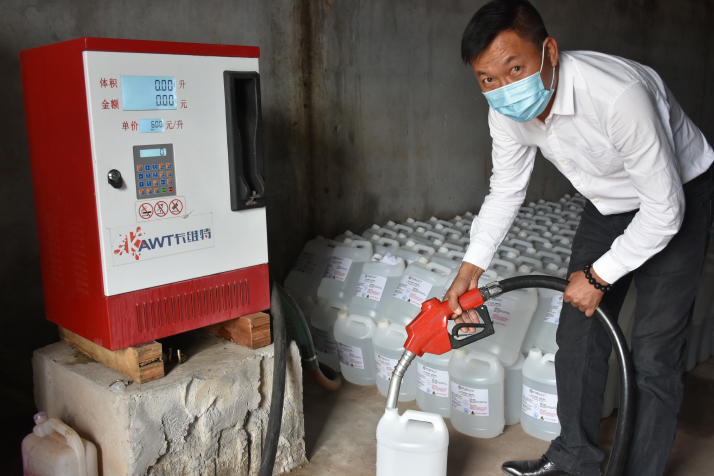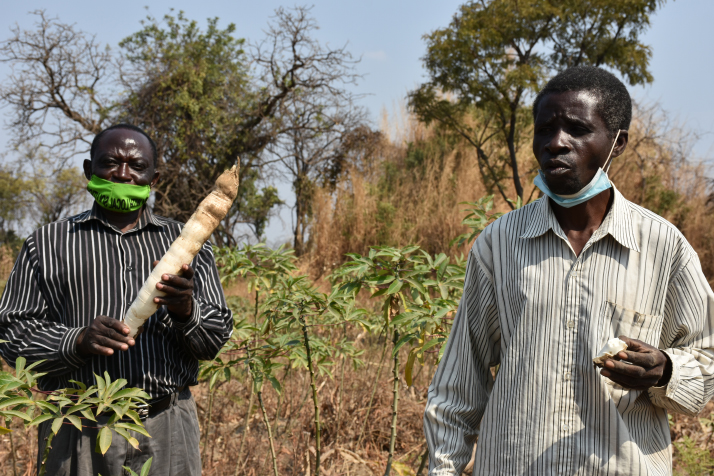| World |
| Zambia raises production of its second-largest crop to diversify food basket, boost agricultural income | |
|
|
 Zhongkai International Chief Executive Officer Chen Guiping refuels ethanol in containers ready for sale (Derrick Silimina)
A humble tuberous starchy root that ought to be cooked properly and eaten safely is gaining attention for its commercial use. Once considered as a poor man's crop, cassava is Zambia's second-largest agricultural produce after maize. Unlike maize, however, it does not require a lot of water - a big advantage in the drought-prone country. Cassava is now grown by about half a million small-scale farmers in Zambia as part of a push to diversify agriculture beyond maize, the country's drought-vulnerable staple. It is estimated that annual cassava production saw a rise of over 6 percent in the last five years, according to the Ministry of Agriculture of Zambia. But most of the cassava farmers are struggling to sell the commodity to nearby villages or urban areas due to a volatile market and poor road conditions. Amos Nsama, 52, is a cassava farmer from Kasama District in Northern Province of Zambia and has over the years found it difficult to sell his cassava produce due to numerous hurdles. "I first started cassava production while living in Luapula Province; but lack of demand for cassava forced me to move to Northern Province in search of a lucrative market," Nsama said. "I owned oxen, an ox-cart and a plough. But lack of market in the area discouraged me to produce on a large scale as the produce would sometimes go to waste." Ruth Chitambo is another cassava farmer and trader who started her agribusiness in 2015 by supplying cassava to Lusaka's sprawling Soweto market. But low profits from the commodity have slowly dampened her morale to cultivate the root crop despite its massive value to the country's food security and industrial development. "With the hard economic times, consumers are not buying as much cassava as before. As a result, it is negatively affecting my business as this is my only source of income," Chitambo complained. New markets While household demand for cassava has been stagnant over the years, industries are coming up with sustainable means of producing their goods using agricultural goods. Cassava is one of their major raw materials. The government and development organizations have since launched efforts to find new markets for the tuber, in hope that more of it will be grown to raise agricultural income countrywide. These efforts are paying off, and the solution is coming from an unexpected source: manufacturing. With the onset of COVID-19 pandemic, notable by-products made from cassava such as ethanol that is used for making hand sanitisers have created a large demand. Other uses include stock feed and flour to prepare food and beer. This new demand is creating jobs for intermediaries between farmers and industrial manufacturers in Zambia. One manufacturing firm that is adding value to the cassava produce is Zhongkai International, a Chinese-owned multi-million-dollar company with a plant in central Zambia. The Chinese manufacturing plant uses cassava as its major raw material to produce various by-products, including ethanol, for industrial use, glue and feed for livestock, which benefit many cassava farmers. "Our final product is ethanol and that is why we need this crop (cassava). For instance, the cassava from Mansa District has 75 percent starch and we found out that the best cassava in Africa comes from Zambia," Zhongkai International Chief Executive Officer Chen Guiping told ChinAfrica. "Before setting up the factory, we visited all African countries and found that the produce in Zambia had the highest starch percentage; so, we established the factory in this country." Chen disclosed that his company uses about 200 tons of dried cassava, and that from just 1 lima (0.49 hectare) of land, a farmer can easily raise about K5,000 ($231) cash that can go a long way in supporting their livelihood.  Amos Nsama (right) in his cassava field. He is one of the suppliers of the commodity to Zhongkai International, a Chinese owned firm (Derrick Silimina)
Game changer Arguably, the new industrial demand is gradually encouraging more farmers and traders to expand their operations. Entrepreneur Monica Chanda buys dried cassava from farmers in northern Zambia for resale in bulk to Zhongkai International. "While they (farmers) concentrate on producing cassava, I focus on dealing with my industrial clients," said Chanda. Meanwhile, in the midst of climate change, agricultural experts have recognized cassava as one of the cash crops which has potential to create wealth for farmers in the Southern African country prone to annual droughts, while at the same time enhancing national food security and adding value to industrial production. "I heard about companies supporting cassava farmers and decided last year to buy farmland and produce cassava," said Kelvin Chilwalo, a cassava grower from Gwembe in south Zambia. "Since cassava is drought-resistant, I believe it will do fine here. I expect to harvest more than 100 bags of 50 kg each and supply to both local and industrial markets." Other notable commercial entities utilizing cassava include Zambian Breweries, a local firm that is also a major bottler for Coca-Cola, which has signed contracts to buy large amounts of cassava. The company procures dried cassava chips from small farmers, processes them into flour and fermented cassava starch, and uses these as ingredients for its Eagle Lager beer. Zambian Breweries needs to ensure a continued supply of cassava. It has contracted 5,000 farmers to grow on average 1 hectare of cassava each. Premiercon Starch Co. is another local start-up firm producing starch and flour from cassava. Among other products, it turns cassava into a starchy feedstock that it sells to mining companies, which in turn use it to process minerals. The company has signed agreements with copper mining companies to supply 7,000 tons of industrial starch per year. Recently, Zhongkai International signed an offtake agreement with Chifwani Concepts, an initiative launched by Zambia's Ambassador to Ethiopia Emmanuel Mwamba to raise cassava production in north Zambia. Speaking during the signing ceremony, Mwamba said the partnership is taking place at a time the government is focusing on widening the food basket beyond maize. "Cassava has been grown as a staple food; but the commercialization of cassava has helped us promote this cash crop under the Chifwani Concepts," Mwamba said. Chifwani Concepts has so far empowered over 1,500 small farmers by providing cassava cuttings. "The partnership we are launching today is first of all in line with what government is doing. The government has focused on crop diversification and job creation and we are shifting from mining to other sectors such as agriculture and manufacturing," Mwamba stated. CA Reporting from Zambia (Print Edition Title: Cassava Commercialization) Comments to zanjifang@chinafrica.cn |
|
||||||||||||||||||||||||||||
|